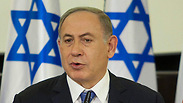
Winds of elections blowing through the Knesset
Op-ed: Despite the Regulation Bill, the Public Broadcasting Corporation and the different investigations breathing down Netanyahu’s neck, the main issue being discussed in the Likud party these days is whether early elections are on the horizon.
One of the Likud ministers encountered one of the main activists from his party at the Knesset cafeteria last week. “There is one thing you should pay attention to,” the activist told the minister, without the faintest glimmer of a smile on his face. “If Bibi is sick in the coming days, we’re headed to elections.”
On Tuesday, the cabinet secretariat announced that the cabinet meeting was being cancelled due to the prime minister’s illness. The flu. The same famous cold that strikes Benjamin Netanyahu every time he experiences one of his paranoia attacks. But having the flu does not mean that you are not being chased. And the main issue discussed in the Knesset last week was not the Regulation Bill or the spate of fires, but whether the elections were on the way.
“It’s exactly like what happened in the previous round in the previous government,” another senior Likud member said. “The same quarrels, the same madness, the same feeling that everyone hates and suspects each other.”

The signs of restlessness were mainly apparent in the back benches of the Likud, which accommodate the Knesset members who were elected in the different districts. According to the Likud constitution, they will have to be elected on the national list next time. In other words, they will have to reach tens of thousands of voters, most of whom have never heard of them.
But the tensions did not spare some of the ministers either. Experienced players like Gilad Erdan and Gila Gamliel, who planned to sit quietly in the coming year and step it up only ahead of the primary elections, are now impatiently watching Minister Miri Regev. Her strategy—to never stop making headlines—suddenly seems like a political genius quality.
Add that to a rare series of events, most of which the prime minister is directly involved in. The submarine affair is not going away. The Germans are investigating, the police are investigating, new details emerge every day (we have yet to receive an answer to whether attorney David Shimron was in the room when Netanyahu decided to replace Defense Minister Moshe Ya’alon with Avigdor Lieberman, and who knew at the time that the decision was worth NIS 120 million to Miki Ganor).
The other investigations against the prime minister are still ongoing, and even the decision to prosecute his wife Sara cannot be stalled forever. Add to that the battle over the new Israeli Public Broadcasting Corporation, the Bezeq Law, the multi-home tax plan which the ultra-Orthodox parties are determined to thwart, and the images waiting for us on December 25, when the bulldozers take on the Amona homes—and you have yourself all of the makings of a perfect storm.
And if I had to bet who will be at the center of the storm if the government is overthrown, my money would be on Bayit Yehudi leader Naftali Bennett. He is the only one in the government who has something to gain from early elections.
“There is no way we will get less than 14 Knesset seats this time,” a senior Bayit Yehudi member said this week. “This time, we won’t let Bibi empty us out.” Bennett cannot afford to concede on the Amona issue, and he knows that if he waits too long, Uri Ariel and Bezalel Smotrich will break up the party right under his nose a moment before he implements his not-so-secretive plan to remove the National Union faction from his party.
Yesh Atid leader Yair Lapid, who was at the center of the previous early elections, is likely experiencing a déjà vu as well. Last week, he submitted a bill to dissolve the Knesset. Such a proposal can only be made once every six months, so if Lapid is firing with such a cannon, he must have detected something that he has already seen in the past.
“We are seeing complete loss of control,” Lapid told me on Wednesday, immediately after the Knesset removed the Regulation Bill from its agenda. “This is the first internal challenge this government is facing, and look what’s happening. Up until now, they had no internal disputes because they were not doing anything apart from cancelling the previous government’s laws. The first time they have an argument they fly off the handle.”
Experience taught us that if there is anything that prompts early elections, it is mainly discussions of early elections. The crazies become crazier, the ideologists become more fanatic, and all of yesterday’s partners become today’s Knesset seat robbers.
Traditionally, the winter session is the longest Knesset session. At the current state of events, there is a good chance it will be shortened.










